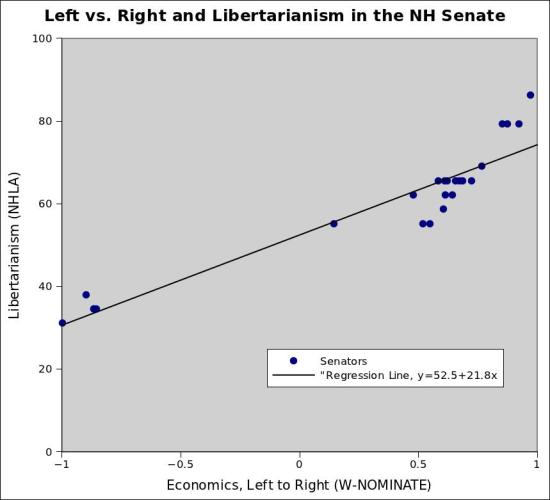Political commentators often lump libertarians in with conservatives on the right, but how accurate is this?
To get a start on this question, I compared New Hampshire legislators’ liberalism or conservatism, as measured by W-NOMINATE, with their libertarianism, as measured by the NHLA’s Liberty Rating. (To make the comparison easier, I used the raw Liberty Rating scores. An “A” is 80-100%, 60-79% is a “B”, 40-59% is a “C”, etc.)
The correlation for the House is very strong, stronger than I expected. Moving from the extreme left to the middle, or from the middle to the extreme right, will on average gain a State Representative 40% on the Liberty Rating, or two full letter grades. 93% of the variance in libertarianism is explained by differences in liberalism and conservatism (that is, R2=.93). And since, according to W-NOMINATE, the liberal-conservative axis is by far the most decisive for voting outcomes in the NH House, this implies that libertarians in the NH House vote very much like conservatives.
The data for the Senate tells the same, albeit more muted, story. (R2=.89)
But there are good reasons to expect this measure to overstate the similarities, especially in the House:
• The speaker of the House explicitly de-emphasized social issues this session, where libertarians and conservatives are more likely to disagree.
• There are basically no votes on foreign policy issues in the NH legislature.
• Republican leadership in the House has a libertarian bent, and this could be nudging conservatives in a more libertarian direction. Libertarian involvement in the Republican Party more generally could also be pushing conservatives to be more libertarian.
• In New Hampshire, Democrats are generally hostile to libertarians, while Republicans are generally welcoming. This could make it easier for right-leaning libertarians to be elected, or it could make it harder for left-leaning libertarians to get elected, or both, skewing the results.
Regardless, even after accounting for economic liberalism/conservatism, State Representatives still have wiggle room. It looks like they can move about 20 percent up or down from the regression line throughout the graph. Presumably, for the most part, this wiggle room results from libertarian votes on non-economic issues.
With that in mind, just for fun, I calculated the residual libertarianism of Keene state representatives– that is, their libertarianism after accounting for liberalism/conservatism. (I won’t do the same for Senator Molly Kelly, since there’s less data on the Senate. Cynthia Chase is missing because she was not present for enough NHLA votes to get a Liberty Rating.) Assuming representatives can go up or down 20 percent, the residuals range from +20 (most libertarian) to -20.
| Representative | Position | Residual Libertarianism |
| Cynthia Chase |
(-.67, NA)
|
NA
|
| Sam Hawkes |
(-.37, 20)
|
-15
|
| Gladys Johnsen |
(-.52, 28)
|
-1
|
| Steve Lindsey |
(-.37, 48)
|
+13
|
| David Meader |
(-.60, 32)
|
+6
|
| Kris Roberts |
(-.57, 30)
|
+3
|
| Chuck Weed |
(-.76, 34)
|
+14
|
(See Free Keene’s new Voter info page for more information on local representatives.)




